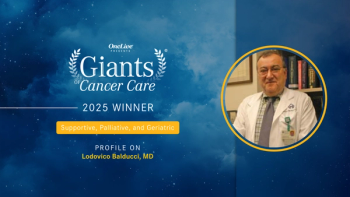
Diagnosis and Initial Treatment of MTC
For High-Definition, Click
Medullary thyroid cancer is commonly diagnosed following the discovery of a mass in the neck, which may cause discomfort, explains Gary L. Clayman, DMD, MD. Once diagnosed, patients should receive genetic counseling, since the disease can be inherited. In addition to those who present with a mass, some patients are diagnosed following the onset of symptoms, such as diarrhea, explains Naifa L. Busaidy, MD. In patients with the hereditary condition multiple endocrine neoplasia (MEN) type 2B, dentists often detect mucosal neuroma during a routine visit, leading to diagnosis, notes Busaidy.
MTC appears as a neuroendocrine carcinoma under the microscope, and is generally differentiated based on calcitonin and CEA levels, notes Manisha H. Shah, MD. Patients who may have hereditary MTC should be evaluated in an interdisciplinary program that includes an endocrinologists, surgeon, genetic counselor, diagnostic imaging, and social work supportive services, suggests Clayman.
Following genetic counseling, all patients with MTC should receive RET oncogene testing, since this gene is associated with MEN2. If the first person in a family diagnosed with MTC tests positive for the RET mutation, other members of the family should also be tested, suggests Busaidy.
Plasma metanephrine testing should be utilized prior to surgery to rule out pheochromocytoma. Additionally, baseline calcium and parathyroid hormone levels should be checked, Busaidy advises. It can be beneficial to examine calcitonin and CEA levels prior to surgery, suggests Francis P. Worden, MD. This can help set a baseline and ascertain whether the MTC is the primary tumor.
Controversy exists regarding the collection of calcitonin and CEA levels in patients who do not have a confirmed diagnosis of MTC, notes Shah. Additionally, since these marker levels tend to drop slowly following surgery, a presurgery baseline should not immediately be compared to postsurgery numbers. In general, Clayman suggests waiting 3 months before examining postsurgery calcitonin levels.


































